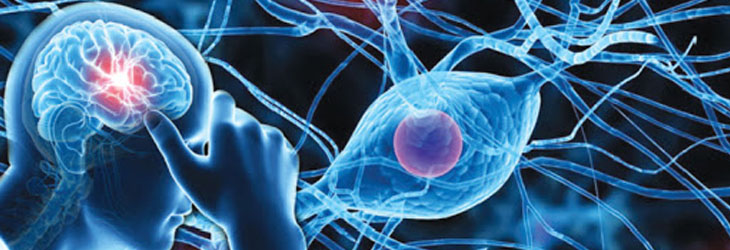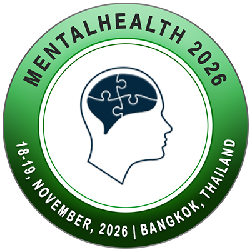Track: Neurology and Neurological Disorder

“Advances in Neurology and the Management of Neurological Disorders: From Diagnosis to Treatment”
This session will provide an overview of neurology and neurological disorders, focusing on how neurological conditions impact mental health and behavior. Attendees will gain insights into common neurological disorders such as epilepsy, multiple sclerosis, Parkinson's disease, and Alzheimer's disease, and their effects on cognitive and emotional functioning. The session will cover the role of neurology in diagnosing and managing these conditions, including the use of neuroimaging and other diagnostic tools. Participants will also explore the intersection of neurology and mental health, discussing how neurological disorders can contribute to psychological symptoms and the importance of a multidisciplinary approach to treatment.
Neurodegenerative Diseases: Pathophysiology and Treatment
This session will focus on the pathophysiology of neurodegenerative diseases such as Parkinson's disease, Alzheimer's disease, and amyotrophic lateral sclerosis (ALS). Participants will explore the molecular and cellular mechanisms underlying these conditions and discuss current and emerging treatment options aimed at slowing disease progression and improving patient quality of life.
This session will focus on the pathophysiology of neurodegenerative diseases such as Parkinson's disease, Alzheimer's disease, and amyotrophic lateral sclerosis (ALS). Participants will explore the molecular and cellular mechanisms underlying these conditions and discuss current and emerging treatment options aimed at slowing disease progression and improving patient quality of life.
The Role of Genetics in Neurological Disorders
This session will examine the genetic factors that contribute to neurological disorders like Huntington's disease, Duchenne muscular dystrophy, and hereditary neuropathies. Attendees will learn about the latest research in neurogenetics, including gene therapy, genetic testing, and personalized medicine approaches targeting specific genetic mutations.
This session will examine the genetic factors that contribute to neurological disorders like Huntington's disease, Duchenne muscular dystrophy, and hereditary neuropathies. Attendees will learn about the latest research in neurogenetics, including gene therapy, genetic testing, and personalized medicine approaches targeting specific genetic mutations.
Pediatric Neurology: Challenges and Innovations
This session will focus on the unique challenges of diagnosing and treating neurological disorders in children, including cerebral palsy, autism spectrum disorders, and pediatric epilepsy. Participants will explore innovations in pediatric neurology, including early intervention strategies, developmental therapies, and the role of neuroplasticity in recovery.
This session will focus on the unique challenges of diagnosing and treating neurological disorders in children, including cerebral palsy, autism spectrum disorders, and pediatric epilepsy. Participants will explore innovations in pediatric neurology, including early intervention strategies, developmental therapies, and the role of neuroplasticity in recovery.
Epilepsy: Innovations in Diagnosis and Management
This session will cover the latest innovations in diagnosing and managing epilepsy, including advances in neuroimaging, electroencephalography (EEG), and genetic testing. Attendees will discuss new pharmacological treatments, surgical options, and neurostimulation techniques improving outcomes for patients with epilepsy.
This session will cover the latest innovations in diagnosing and managing epilepsy, including advances in neuroimaging, electroencephalography (EEG), and genetic testing. Attendees will discuss new pharmacological treatments, surgical options, and neurostimulation techniques improving outcomes for patients with epilepsy.
Multiple Sclerosis: Pathophysiology and Emerging Treatments
This session will provide an in-depth look at multiple sclerosis (MS), exploring its pathophysiology, including immune-mediated processes leading to demyelination and neurodegeneration. Attendees will discuss current treatment options and promising new therapies that aim to modify the disease course and improve quality of life for individuals with MS.
This session will provide an in-depth look at multiple sclerosis (MS), exploring its pathophysiology, including immune-mediated processes leading to demyelination and neurodegeneration. Attendees will discuss current treatment options and promising new therapies that aim to modify the disease course and improve quality of life for individuals with MS.
Neuromuscular Disorders: Diagnosis and Management
This session will cover the diagnosis and management of neuromuscular disorders, such as amyotrophic lateral sclerosis (ALS), muscular dystrophies, and peripheral neuropathies. Participants will learn about the latest diagnostic tools, including genetic testing and electromyography (EMG), as well as emerging treatments offering hope for patients with these conditions.
This session will cover the diagnosis and management of neuromuscular disorders, such as amyotrophic lateral sclerosis (ALS), muscular dystrophies, and peripheral neuropathies. Participants will learn about the latest diagnostic tools, including genetic testing and electromyography (EMG), as well as emerging treatments offering hope for patients with these conditions.
The Gut-Brain Axis: Implications for Neurological Disorders
This session will explore the emerging field of the gut-brain axis and its implications for neurological disorders. Participants will examine how the gut microbiome influences brain function and contributes to conditions like Parkinson's disease, multiple sclerosis, and anxiety disorders. The session will also discuss potential therapeutic approaches, such as diet, probiotics, and fecal microbiota transplantation.
This session will explore the emerging field of the gut-brain axis and its implications for neurological disorders. Participants will examine how the gut microbiome influences brain function and contributes to conditions like Parkinson's disease, multiple sclerosis, and anxiety disorders. The session will also discuss potential therapeutic approaches, such as diet, probiotics, and fecal microbiota transplantation.
Advances in Neuroimaging Techniques
This session will delve into the latest advancements in neuroimaging technologies, such as functional MRI (fMRI), PET scans, and diffusion tensor imaging (DTI). Attendees will learn how these tools are used to diagnose and monitor neurological disorders, providing insights into brain function, structure, and the progression of diseases like Alzheimer's, epilepsy, and multiple sclerosis.
This session will delve into the latest advancements in neuroimaging technologies, such as functional MRI (fMRI), PET scans, and diffusion tensor imaging (DTI). Attendees will learn how these tools are used to diagnose and monitor neurological disorders, providing insights into brain function, structure, and the progression of diseases like Alzheimer's, epilepsy, and multiple sclerosis.
Scientific Highlights
- Mental Health
- Women’s Mental Health
- Psychology and Psychiatry
- Autism
- Stress, Anxiety and Depression
- Psychotherapy and Counseling Psychology
- Behavioral Health and Bullying
- Suicide and Self Harm
- Bipolar Disorder
- Schizophrenia
- Neurology and Neurological Disorder
- Addiction
- Obesity and Eating Disorder
- Child and Adolescent Psychiatry
- Obsessive Compulsive disorder
- Post-Traumatic Stress Disorder
- Personality Disorder
- Child Abuse
- Legal and Ethical Issues in Clinical Research


